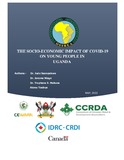| dc.description.abstract | This study delved into three questions: 1) How did COVID19 affect the social and
economic lives of youths and their communities? 2) What explains the effects of COVID19
on youths and their communities? 3) What lessons may be drawn out of these effects, their
outcomes and the factors underlying them for recovery and efforts to manage similar
emergencies that may come up in the future? The findings were that youths, especially
females, were exposed to lack of medical care; food insecurity; domestic violence, stress
and family separation; delinquency and disorientation from education; human rights
abuses; and drug abuse, mental health problems and social ills. Environmental degradation
and loss of confidence in government’s ability to deliver social services was also reported.
These were found to have been due to highhanded, one-size-fit-all, enforcement of
lockdown and failure of the safety nets that were devised to mitigate vulnerability.
Imposition of lockdown was widely perceived as having been expedient. Indeed, it was
credited for having controlled the spread of COVID19, improving hygiene, reducing the
incidence of hygiene-related diseases like diarrhea, and drawing some men into domestic
spheres of care, against unproductive traditional stereotyping of gender roles. However,
gaps in its implementation and lack of attention to relevant social, economic and medical
needs exposed youths and their communities to socioeconomic vulnerability and
undermined the goals of the COVID19 response. Hence, it is concluded that for them to be
effective, responses to emergencies should follow systemic, holistic and participatory
approaches. | en |

